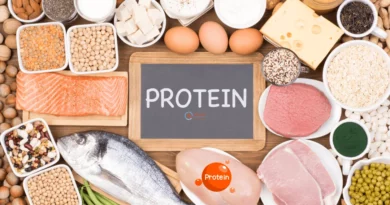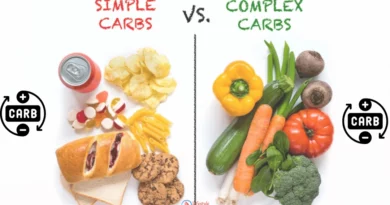Nutrition: Everything You Need to Know About Eating Healthy
Eating healthy is one of the most important things you can do for your overall health and well-being. A healthy diet can help you maintain a healthy weight, reduce your risk of chronic diseases, and improve your mood and energy levels.
But what does it mean to eat healthy? There is a lot of information out there about nutrition, and it can be hard to know where to start. In this article, we will break down the basics of nutrition and give you some tips on how to eat healthy.
What is Nutrition?
Nutrition is the study of how food affects the body. It includes the study of the nutrients that our bodies need to survive and function properly. Nutrients are substances that our bodies need to grow and repair tissues, produce hormones and enzymes, and support immune function. These substances can be broadly categorized into macronutrients, micronutrients, and hydration.
Macronutrients
Carbohydrates:
Carbohydrates are the body’s primary source of energy. They are broken down into glucose, which fuels our muscles and brain. Carbohydrates are found in foods like grains, fruits, vegetables, and legumes.
Proteins:
Proteins are the building blocks of the body, crucial for tissue repair, immune function, and more. Sources of protein include meat, dairy, legumes, nuts, and seeds.
Fats:
Fats are essential for hormone regulation, cell function, and energy. Healthy fats can be sourced from avocados, nuts, seeds, and olive oil.
Understanding the importance of each macronutrient and ensuring a balanced intake is vital for maintaining good health. Carbohydrates provide immediate energy, proteins aid in repair and growth, and fats are crucial for long-term energy and overall health.
Micronutrients:
Vitamins:
Vitamins are vital for various bodily functions, such as immune support, wound healing, and metabolism. They can be obtained from a diverse diet that includes fruits, vegetables, whole grains, and dairy products.
Minerals:
Minerals like calcium, iron, potassium, and zinc are essential for bone health, oxygen transportation, muscle function, and more. Foods like leafy greens, dairy, nuts, and seeds are rich sources of minerals.
Dietary Fiber:
Dietary fiber aids in digestion helps maintain a healthy weight and lowers the risk of chronic diseases. Whole grains, fruits, vegetables, and legumes are excellent sources of dietary fiber.
Balancing the intake of micronutrients is crucial to ensure our body functions optimally. A variety of fruits, vegetables, whole grains, and lean proteins can provide the spectrum of vitamins and minerals our body needs.
Water:
Hydration is fundamental to good health. Water supports digestion, nutrient absorption, temperature regulation, and more. It is recommended to consume an adequate amount of water daily, typically around 8 cups or 2 liters for an average adult.
How to Eat Healthy
To eat healthy, it is important to focus on a variety of nutrient-rich foods. This means eating plenty of fruits, vegetables, whole grains, lean protein, and healthy fats. Limiting your intake of processed foods, sugary drinks, and unhealthy fats is also important.
Some tips for Eating Healthy Food
- Eat plenty of fruits and vegetables. Fruits and vegetables are packed with vitamins, minerals, and antioxidants. Aim to eat at least five servings of fruits and vegetables each day.
- Choose whole grains over refined grains. Whole grains are a good source of fiber, which can help you feel full and satisfied after eating. Refined grains have been stripped of their fiber and nutrients.
- Choose lean protein sources. Lean protein sources are low in saturated fat and calories. Good sources of lean protein include chicken, fish, beans, tofu, and nuts.
- Choose healthy fats. Healthy fats are good for your heart and overall health. Good sources of healthy fats include olive oil, avocados, nuts, and seeds.
- Limit processed foods. Processed foods are often high in unhealthy fats, sugar, and sodium. It is best to limit your intake of processed foods as much as possible.
- Limit sugary drinks. Sugary drinks are high in empty calories and can contribute to weight gain and other health problems. It is best to limit your intake of sugary drinks, such as soda, juice, and sports drinks.
- Drink plenty of water. Water is essential for good health. Aim to drink eight glasses of water each day.
- Eating healthy doesn’t have to be complicated. By following these tips, you can ensure you are getting the nutrients you need to stay healthy and energized.
Common Nutritional Myths and Facts
In the world of nutrition, myths often overshadow facts, leading to confusion about what constitutes a healthy diet. It’s crucial to distinguish between popular beliefs and evidence-based facts to make informed decisions about what we eat. Let’s debunk some common nutritional myths and present the facts.
Myth: Carbs are Bad for You
Fact: Carbohydrates are essential for energy and overall health. The key is to choose complex carbohydrates like whole grains, fruits, and vegetables over refined carbs.
Myth: All Fats are Unhealthy
Fact: Healthy fats like those found in avocados, nuts, and olive oil are crucial for heart health and overall well-being. It’s saturated and trans fats that should be limited.
Myth: Skipping Meals Helps in Weight Loss
Fact: Regular, balanced meals are important for metabolism and weight management. Skipping meals can lead to overeating later in the day.
Myth: Protein Only Comes from Meat
Fact: Protein is abundant in various plant-based sources like beans, lentils, tofu, and quinoa, making it possible for vegetarians and vegans to meet their protein needs.
Myth: Going Gluten-Free is Healthier for Everyone
Fact: Unless you have a gluten intolerance or celiac disease, eliminating gluten from your diet is unnecessary and may lead to nutrient deficiencies.
Myth: Natural Sugar is Better than Added Sugar
Fact: Sugar is sugar, whether natural or added. While natural sugars come with some nutrients, they should still be consumed in moderation.
Myth: Detox Diets Cleanse Your Body
Fact: Our organs, like the liver and kidneys, naturally detoxify the body. Detox diets are not scientifically proven and can be harmful.
Myth: Eating Late at Night Causes Weight Gain
Fact: Weight gain is more about the number of calories you consume throughout the day rather than when you eat. It’s about overall balance.
Myth: Egg Yolks are Unhealthy
Fact: Egg yolks are a rich source of essential nutrients, including vitamins, minerals, and healthy fats. They can be part of a healthy diet.
Myth: Low-fat or Fat-Free Products are Always Healthy
Fact: Many low-fat products contain added sugars or unhealthy additives. Opt for whole, minimally processed foods instead.
It’s important to critically evaluate nutrition information and consult professionals for personalized advice. Stay informed and nourish your body with accurate knowledge.
Conclusion
Eating healthy is one of the best things you can do for your overall health and well-being. A healthy diet can help you maintain a healthy weight, reduce your risk of chronic diseases, and improve your mood and energy levels.
To eat healthy, focus on a variety of nutrient-rich foods, such as fruits, vegetables, whole grains, lean protein, and healthy fats. Limit processed foods, sugary drinks, and unhealthy fats. Drink plenty of water throughout the day.
By following these tips, you can ensure you are getting the nutrients you need to stay healthy and energized.
Frequently Asked Questions (FAQs) about Nutrition
What is Nutrition?
Nutrition is the science that studies the interaction between living organisms and the substances they consume, focusing on how food and drink influence growth, health, and disease.
Why is Nutrition Important?
Nutrition is vital for overall health, providing essential nutrients that support bodily functions, growth, repair, and energy production. A balanced diet helps in disease prevention and promotes well-being.
What are Macronutrients and Micronutrients?
Macronutrients are nutrients needed in larger quantities and include carbohydrates, proteins, and fats. Micronutrients are needed in smaller amounts and include vitamins, minerals, and dietary fiber.
What are the Essential Nutrients?
Essential nutrients are substances our body needs for optimal function but cannot produce in sufficient amounts. These include certain amino acids, fatty acids, vitamins, and minerals.
How Can I Maintain a Healthy Diet?
A healthy diet involves consuming a variety of whole foods, including fruits, vegetables, whole grains, lean proteins, and healthy fats. Portion control and moderation are key.
How Much Water Should I Drink Daily?
Adequate hydration varies based on factors like age, sex, climate, and physical activity. A general guideline is about 8 cups (64 ounces) of water per day, but individual needs may vary.
What are Empty Calories?
Empty calories refer to foods and drinks that provide little to no nutritional value, primarily added sugars and solid fats. These contribute to weight gain without supplying essential nutrients.
Is a Vegetarian or Vegan Diet Healthy?
A well-planned vegetarian or vegan diet can be nutritionally adequate, providing all essential nutrients. These diets can offer health benefits, including reduced risk of heart disease and certain cancers.
How Can I Manage Weight through Nutrition?
Weight management involves a balance between calories consumed and calories expended. It’s essential to eat a balanced diet, control portion sizes, and engage in regular physical activity. if you are seriously looking to lose weight you should contact professionals (might be a doctor, or dietician).
Can Nutrition Prevent Chronic Diseases?
A healthy diet can significantly reduce the risk of chronic diseases like heart disease, diabetes, and certain cancers. Nutrient-rich foods support a strong immune system and overall well-being.
Can I Indulge in Treats While Maintaining a Healthy Diet?
Yes, occasional treats are okay within a balanced diet. It’s important to enjoy these in moderation while prioritizing nutrient-dense foods for overall health.
Also Read:
For News related to entertainment visit our entertainment website:
https://www.glamworldtalks.com/



